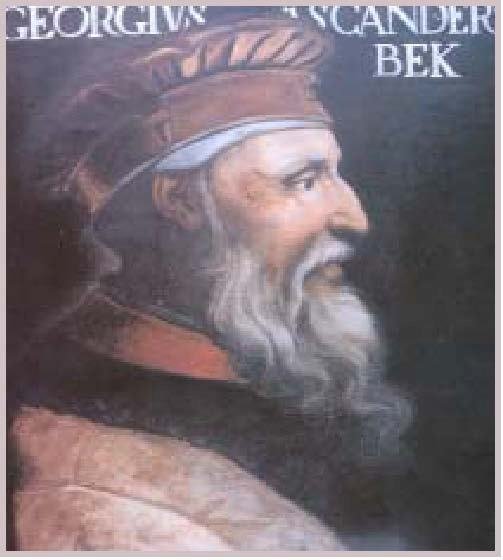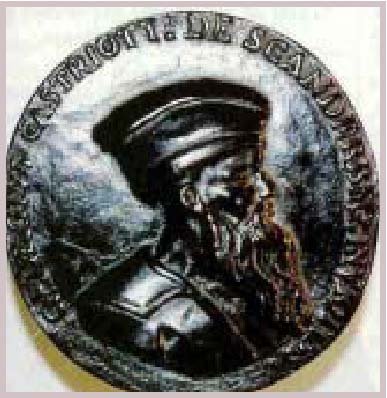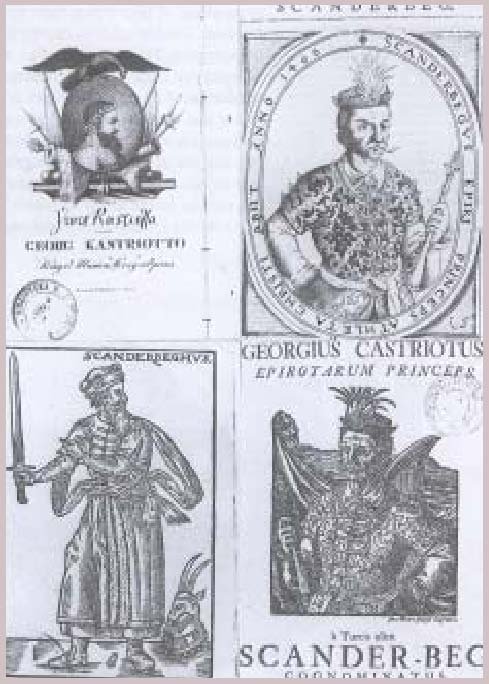GJERGJ KASTRIOTI – SCANDERBEG (ALBANIAN NATIONAL HERO)
Gjergji (George) was born of a noble Albanian family. He was the youngest of the four children and spent his childhood with his family in Albania. As to his youth, there is no common ground in the historiography writings of Skanderbeg. Most authors support Marin Barleti’s “History of Skanderbeg” 1508-1511, where it is stated that young Gjergj was taken as a hostage to the Sultan’s court at the age of 8, where he followed the School of Ichoghlans. Some others maintain that he was taken hostage at the age of 18, and others hold that he had gone as a vassal to the Sultan’s court between 1423 to 1426. In any case, he received the name of Skënder (Alexander). In his first battle, fought on behalf of the Sultan, Skënder stood out as a capable and brave fighter and before long he won the title of bey, thus Skanderbeg, and was promoted to the position of a Sanjak-Bey. During 1436 and 1437 Skanderbeg served in several positions in Albania. On his father’s death, Skanderbeg was expected to succeed him as the head of the principality of Kastriots, instead he was appointed to serve the Ottoman Empire away from his native land. Such an appointment was rather an exile.
He had long been awaiting an opportunity and one was given to him on the occasion of a battle between Hungarians and Ottomans in 1443. According to a long-prepared plan, along with hundreds of Albanian fighters, Skanderbeg deserted the battle at Nish and made for his motherland. This act was the signal for a general uprising. Skanderbeg was declared “Chief of the independent principality of Kastriots with Krujë as its capital”.
Experience taught Skanderbeg that the victories won until then could not be carried further under the existing political-military alliance. Therefore he created an indepen-dent State, which was his second major achievement after the liberation of the country from the Ottomans. The Albanian State extended from the Highlands of Dukagjin in the north to Devoll and Seman Rivers in the south and from the Adriatic littoral in the west to the Drin valley in the east. Skanderbeg fought the Ottomans for 25 years in succession and won 24 battles.
He was an ingenious fighter, captain and strategist. He would prepare the strategy of war, lead the army and fight valiantly as a soldier in the open field of the battle. His prefered tactic in war was to act in the offensive. When on the defensive, Skanderbeg applied the principle of “defence through attack”. The element of surprise was part of his tactics. He established the principle that “victory is not dependent on the size of the army”. Skanderbeg’s abilities as a distinguished commander were appreciated by a number of prominent dignitaries in Europe. The British statesman of the 17th century, William Temple, ranked Skanderbeg among the seven great captains, alongside Belisarius, Hunyadi, etc. The French philosopher Voltaire wrote, “if the Byzantine emperors had been Skanderbegs, the Eastern Empire would have been saved”.
Skanderbeg was also a capable diplomat. He appealed to European countries to fight side by side with Albanians against the Ottomans. He was greatful for the contribution of the Popes and Italian States in general, which is evident in the treaties he signed — one with the King of Naples (March 26, 1451) and two with Venice. On occasions he would make truces even with the Sultan to encourage European States to provide their promised assistance.
For his invaluable contribution to the protection of European lands and their way of life, Skanderbeg earned during his lifetime the titles of “Protector of Christianity”, “Champion of Christ”, and many others.

Scanderbeg portret Uffizi, Gallery Florence

Medal with Scanderbeg portret -conserved in Zagreb

Frontpieces of books published for Skanderbeg in Europe

Emblema dedicated to Skanderbeg from European allies as a protector of Christianity
MARIN BARLETI (1460-1512?)
Marin Barleti is perhaps the most distinguished figure among Albanian humanists. He is considered as the first and the greatest historian of Albanian historiography. Born in Shkodër, he was a scholar and clergyman and fought in the battles for the defence of Shkodër in 1474 and 1478. After the fall of Shkodër, Barleti migrated to Venice where he continued to live within the Church. He became a profound connoisseur of history, classical literature and the Latin language in which he wrote his works: “Historia de vita et rebus gestis Scanderbegi” (Rome 1508-1511), “The Siege of Shkodër” (De obsidione Scodransi, Venice, 1504) and “A Brief History of Lives of Popes and Emperors” (Compendium vitarum ponticum et imperatorum, Venice, 1555). He regarded history as a science and stated that the main task of history is to seek the truth. By examining various sources, he has tried to present through his work the objective character of history.
Congratulations @anled! You have received a personal award!
Click on the badge to view your Board of Honor.
Congratulations @anled! You received a personal award!
You can view your badges on your Steem Board and compare to others on the Steem Ranking
Do not miss the last post from @steemitboard:
Vote for @Steemitboard as a witness to get one more award and increased upvotes!